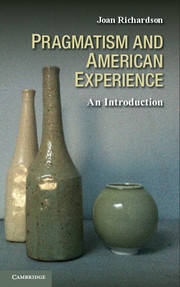Preface
Published online by Cambridge University Press: 05 June 2014
Summary
If this life be not a real fight, in which something is eternally gained for the universe by success, it is no better than a game of private theatricals from which one may withdraw at will. But it feels like a real fight – as if there were something really wild in the universe which we, with all our idealities and faithfulnesses, are needed to redeem; and first of all to redeem our own hearts from atheisms and fears. For such a half-wild, half-saved universe is our nature adapted. The deepest thing in our nature is … this dumb region of the heart in which we dwell alone with our willingnesses and unwillingnesses, our faiths and fears. As through the cracks and crannies of caverns those waters exude from the earth’s bosom which then form fountain-heads of springs, so in these crepuscular depths of personality the sources of all our outer deeds and decisions take their rise. Here is our deepest organ of communication with the nature of things … here possibilities, not finished facts, are the realities with which we have actively to deal.
This famous passage near the closing of William James’s 1895 address, “Is Life Worth Living?” lies at the heart of pragmatism and of American experience. The address was collected in a volume published two years later entitled The Will to Believe and Other Essays in Popular Philosophy, which James dedicated to his “Old Friend, Charles Sanders Peirce,” whom he had named as the founder of pragmatism, and of whom Ian Hacking has said, “He finished nothing, but began everything.” Pragmatism springs from the realization that each of us has a real stake in what the world is to become, “that our own reactions on the world, small as they are in bulk, are integral parts of the whole thing, and necessarily help to determine the definition.” James stressed feels in his address because of all he had come to know over the previous quarter-century from his investigations and experiments in the nascent field of psychology. “The mind feels when it thinks,” Jonathan Edwards, one of James’s studious ghosts, had observed a century and a half earlier.
- Type
- Chapter
- Information
- Pragmatism and American ExperienceAn Introduction, pp. vii - xivPublisher: Cambridge University PressPrint publication year: 2014



